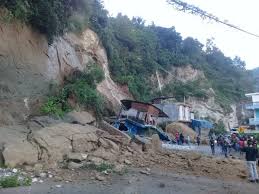A couple of weeks ago we went shopping in town as usual, but the traffic was very congested. In fact, on the way home, it took us 40 minutes just to get out of town, instead of the usual 5 minutes. The main problem with traffic jams here are the old U.S. school buses and large 18-wheelers trying to navigate the narrow roads in town with 6-point turns at some corners. This happens because the main highway that runs north-south through Chichicastenango goes through the narrow grid of streets that were created before cars existed here.
We later found out that the "traffic police," were absent because the town mayor called them off the job to help him with some other business. Three of these officers direct traffic in the three main intersections in town rather than traffic lights. We heard that there was a lot of frustration with the mayor over this issue! And we found out how important those three traffic workers are!











